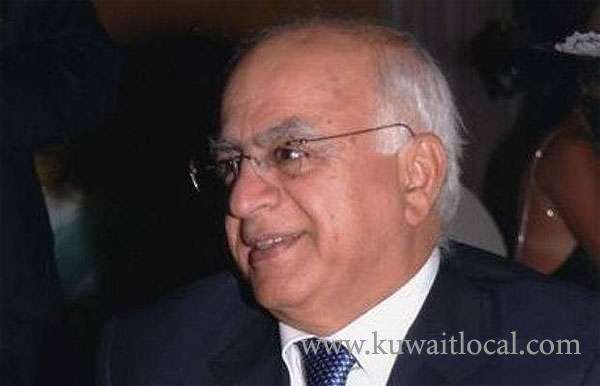Latest News
- Ministry Of Health Refute Rumors On Non-availability Of Antibiot...
- Amir Of Kuwait And Jordan King Renew Commitment To Regional Secu...
- 37 Arrested With Narcotics And Firearms
- Outrage Over Candidate's Arrest
- Six Stores Shut Down In Jahra For Selling Fake Goods
- Peddlers Caught With Drug Pills And Crystal Meth
- PAFN Shuts Down Restaurants And Bakeries Over Violations
- MoI Officer And Lawyer Jailed On Fraud Charges For Bad Cheques
- Thousands Of Bangladeshis Gathered To Pray For Rain
- Kuwait University Symposium Addresses Student Counselors' Role I...
- Kuwait Affirms The Importance Of Group Work In Addressing Common...
- Urgent Call For Kuwaitization: Civil Service Commission Aims For...
Prof And The Art Of Translation

The former academic and professor of translation, Tareq Fakhreddine, drew my attention to a fact I did not realize. Addressing the Association of the Teaching Staff at the Public Authority for Applied Education and Training Professor Tareq said that the use of translation while he was studying a language at the university was forbidden during lectures, except during the translation lectures of course.
It was forbidden to use another language or to resort to bilingual glossaries, or to translate the text into Arabic, for example, because the learner of English should learn to think, understand and communicate, and not disturb his mind with another language.
Thus it became difficult to use translation in education, within the vestiges of Macaulay’s colonial philosophy applied on him at this time (Macaulayism refers to the policy of ostensibly eliminating indigenous culture through the planned substitution of the alien culture of a colonizing power via the education system), especially that his English teachers fancied that their language should prevail, and the translation of its texts, even in the mind of the recipient, would prevent the spontaneous reception of it, and confuse his thinking, but they forgot that the students, in order to absorb what was taught to them, were conducting rapid and often confusing mental translations. However, understanding the texts of novels and plays in English was difficult, especially in the early stages.
So during his last semester of teaching translation at the Kuwait University, Professor Tareq experimented what he had dreamt of long ago and applied it. He asked one of his students to read the Arabic translation of a Shakespearean play, before studying it in its original language. There was a protest from the students, but he convinced them to continue and accept his idea.
They came to the second lecture after reading and understanding the translation of the play and he told the students: “Now forget the Arabic translation and let us go to English Shakespeare,” and noted that they enjoyed every line of it and tasted all its poetic images, despite the difficulty of the Shakespearean language. Their performance exceeded beyond expectations, and they read the English-language explanatory margins in a small line at the bottom of the page and discussed them at length.
He added the pre-reading of translation helped them to learn consciously and break the barrier of foreign language. It also helped them to penetrate the structural barrier of literary work, because they understood the story and knew its characters and understood the events and enjoyed the beauty of the poetic image through the high translation that made them curious to read the play from its linguistic source.
The text became less ambiguous and the students became more purposeful because they were transformed from passive recipients into positive participants in their learning, the translation enabled them to expand their knowledge and understand the space and provided them with a knowledge background that enabled them to link new knowledge they had read to a foreign language.
Professor Tareq concluded by saying that those who were influenced by Macaulay’s theory based on the eradication of knowledge of local language and culture, in order to replace the new culture and language assume that the mind of a linguist is completely free from any prior knowledge, and this an irrational assumption.
A student cannot abandon his mother tongue to divide his mind into two separate cultural classes. Benefiting from the mother tongue and the prior knowledge of the student in learning new skills and knowledge is common in international universities, stressing the positive advantages of the use of translation in various disciplines of university education instead moves at Arabization, which I think is bad, given the failure of Arabization projects in medicine and others.
SOURCE : ARABTIMES
Trending News
-
 Kuwait Implements Home Biometrics Services Ahead O...
14 April 2024
Kuwait Implements Home Biometrics Services Ahead O...
14 April 2024 -
 Kuwait Airways Provides Update On Flight Schedule...
14 April 2024
Kuwait Airways Provides Update On Flight Schedule...
14 April 2024 -
 Kuwait Airways Introduces Convenient Home Luggage...
15 April 2024
Kuwait Airways Introduces Convenient Home Luggage...
15 April 2024 -
 Expat Residency Law Amended By Kuwait Ministerial...
20 April 2024
Expat Residency Law Amended By Kuwait Ministerial...
20 April 2024 -
 Gathering For Eid Al-Fitr Prayers: Kuwaiti Citizen...
10 April 2024
Gathering For Eid Al-Fitr Prayers: Kuwaiti Citizen...
10 April 2024 -
 Two Expats Are Arrested For Stealing From Salmiya...
17 April 2024
Two Expats Are Arrested For Stealing From Salmiya...
17 April 2024 -
 An Egyptian Expat Dies At Kuwait's Airport
11 April 2024
An Egyptian Expat Dies At Kuwait's Airport
11 April 2024 -
 Kuwait Airways Resumes Flights To Beirut And Oman...
15 April 2024
Kuwait Airways Resumes Flights To Beirut And Oman...
15 April 2024 -
 Bay Zero Water Park Kuwait: Summer Season Opens Ei...
11 April 2024
Bay Zero Water Park Kuwait: Summer Season Opens Ei...
11 April 2024 -
 Temperature Increases Cause Electricity Load Index...
21 April 2024
Temperature Increases Cause Electricity Load Index...
21 April 2024












Comments Post Comment